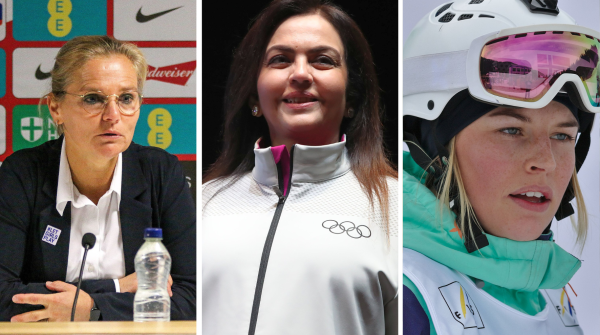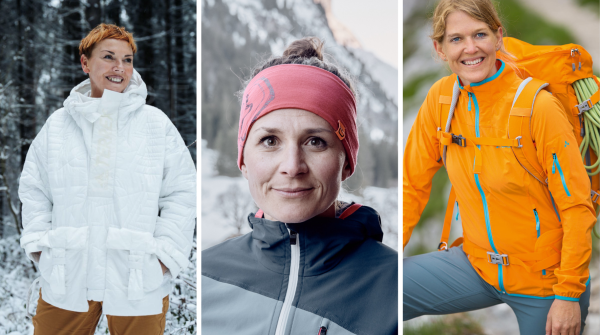
Louroupe grew up like many children in her homeland, the highland region of Pokot in western Kenya. There were 24 siblings in her family and rarely enough food for everyone. Field work and fast barefoot sprints while herding cattle were her childhood routine. Despite this, she managed to have a spectacular running career, holding the marathon world record from 1998 to 2001 . To this day, she is the world record holder over 20, 25 and 30 km and a three-time world champion in the half marathon.
She was also the first woman from Africa to win the New York City Marathon. She has also won marathons in London, Rotterdam, Hong Kong, Berlin and Rome. Today, she campaigns for peace in her home country. In an interview with ISPO.com, she talks about sport and peace, the "Tegla Loroupe Peace Foundation," the Peace Races peace races, and the Refugee Team of the 2020 Olympic Games, which she will accompany to Tokyo as "Chef de Mission.
ISPO.com: Peace through sport is your mission. What special power do you see in sport?
Tegla Loroupe: Sport is borderless. At sporting events, people open up. It's a unique thing! Sport connects people worldwide: regardless of race, religion, tribes or gender. To witness the power with which sport can create peace...is indescribable.
In 2003, you founded the Tegla-Loroupe Peace Foundation (TLPF). What exactly does the foundation do and what are its current projects?
The foundation aims to create a peaceful and just world in which sport is a unifying factor. It aims to create a livelihood for people affected by conflicts and civil wars. Our goal: peaceful coexistence among warring communities in northern Kenya, southern Sudan, northeastern Uganda, Ethiopia and other volatile areas of the African region.
Within TLPF, we focus on three pillars: first, peacebuilding and conflict mitigation through projects such as the Tegla Loroupe Peace Race and also the rehabilitation program for reformed warriors, youth fighters who have laid down their arms. Secondly, on education for peace in our Education and Peace Center for orphans and vulnerable girls. And in the Tegla Loroupe Sports and Training Center, the third pillar, we support talented refugees. Competitive sports and appropriate support for the best are our top priorities.
Your Peace School, founded in 2012, offers children access to sports as well as protection and education. How is the school structured, what are still necessary steps?
The "Tegla Loroupe Education and Peace" school (TLE&PC) opened in January 2012 in Siyoi - Kapenguria, West Pokot. We currently have 460 students - still under construction. The goal is to reach the capacity of 1000 students in the boarding facility. The children should live in a loving environment where they learn to accept each other: with mutual respect, understanding and "sportsmanship". The curriculum includes peace education in addition to the traditional subjects.
Education is essential for progress. Nelson Mandela once said, "Education is the best tool you can use to change the world." In the long term, the center is also to become a training facility for young people with sporting talent who aspire to a career in professional sport. In this way, sport can and should also become an economic outlet for some privileged children - with wider positive consequences for their lives, those of their families and for the region.
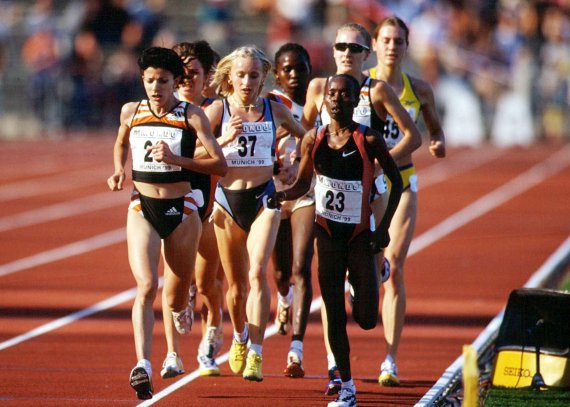
Another sporty component of the TLPF: the "Peace Race", a 10-kilometer distance race that has been held annually in Kenya since 2001. Not only elite long-distance runners are invited, but also warriors from rival African tribes. How can we imagine the races?
Let me tell you how it came about: in 2003, I was invited as a guest runner to a peace race in Bali, Indonesia. At that time, there was political unrest in the country. The government wanted to use the race to restore confidence in the country and its people. I was gripped by the emerging positive dynamics during the race, the energy and the joy of the people: Muslims, Buddhists, Christians - everyone was getting along. I decided to organize a Peace Race for my home region Pokot, Kenya.
Still in the fall of 2003, the first Tegla-Loroupe Peace Race was held in Kapenguria, Pokot. In my country area, livestock is the livelihood for many African tribes. However, animals, grazing land, water and alternative prospects are scarce. As a result, there are armed herders, cattle rustling and fierce fighting among the tribes in the region. I saw the sport as a peacemaking and economic prospect.
The atmosphere that arose during the race was similar to that in Indonesia: warriors from hostile tribes ran together, began cheering each other on - and embracing at the finish line. People who had previously only met on battlefields began talking to each other and learning to appreciate each other.
What changes occurred in the region as a result of the Peace Races?
Within three years, there were almost no more deaths in the region around Kapenguria. We were able to help two of Kenya's most wanted warriors, whose rivalries had claimed many victims, lay down their arms. The warrior "Matanda" not only participated in our rehabilitation program, he is now its chairman.
Over the years, tribal coexistence has improved: negative attitudes, stereotypes and tensions have been reduced; platforms for advocacy and voluntary surrender of firearms have been created. At the same time, the race has shown sport to be a unifying and vital perspective factor.
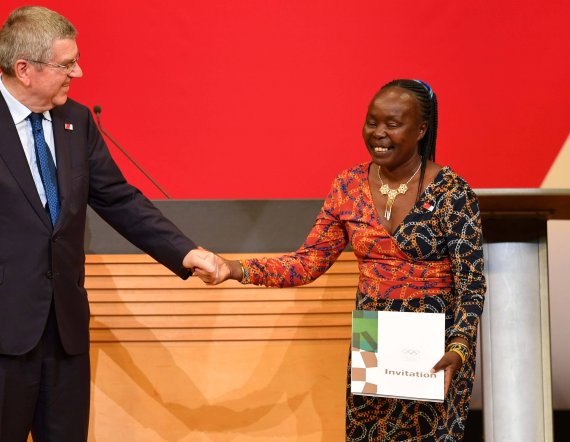
The IOC has once again appointed you "Chef de Mission" of the Refugee Team for the 2020 Tokyo Olympics - after Rio 2016. Tell us about it.
The initiative of the International Olympic Committee (IOC) to create a Refugee Olympic Team for Tokyo 2020 fills me with joy.
In 2016, I already had the great honor of serving as "Chef de Mission" for the Refugee Olympic Team. This was the first time ever that a Refugee Team participated in the Olympic Games. I led the team of 10 athletes who competed in these Games as a beacon of hope for displaced people worldwide. Their stories show the scale of global problems that force people to flee their homes. But they also show what people can achieve when given the chance.
In my role as 2020 "Chef de Mission," I will ensure that the qualified athletes compete successfully and as a team - side by side with the 206 competing nations. The (prospective) Olympians come from Afghanistan, Cameroon, the Democratic Republic of Congo, Eritrea, Ethiopia, the Islamic Republic of Iran, South Sudan, Sudan and Syria. The UNHCR has confirmed refugee status for all of them. They compete in eight sports: Athletics, Badminton, Boxing, Judo, Karate, Swimming, Taekwondo and Weightlifting.
How will the athletes be prepared for the 2020 Olympics? What role does the Tegla Loroupe Foundation play in this?
Through the Tegla Loroupe Sports and Training Center in Ngong - Nairobi, we train 25 refugee and 5 Kenyan athletes. Compared to 2016, the expectations for Refugee athletes for the 2020 Olympics are heightened. Without compromising on standards. Athlete selection is based on top performance - and will be fiercely competitive.
With athlete training already underway, we are focusing on methodologies to achieve the high standards. In addition to a strict diet, this includes participation in local, regional and international competitions, as well as intensive, strategic training and trainer exposure.
What role can the entire sports industry play in this context?
The conclusion of the Tokyo Olympics should not be an end for Refugee athletes: We don't want to train athletes just in hopes of qualifying for the Olympics. We want to help the athletes develop their athletic careers for the long term - for a positive future. I am proud to be part of our peace mission and look forward to more partners from the international sports industry joining me on this journey - to make a difference in the lives of refugee youth through sport.
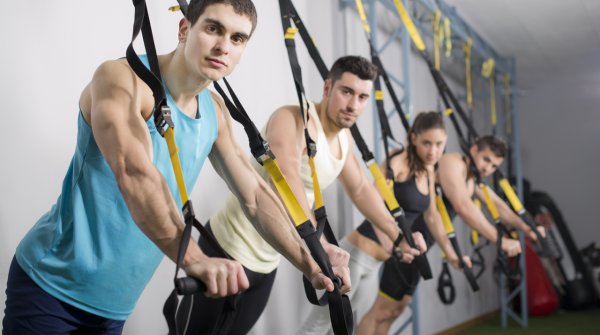 Know-HowThe 11 Best TRX Exercises
Know-HowThe 11 Best TRX Exercises
- Awards
- Mountain sports
- Bike
- Fitness
- Health
- ISPO Munich
- Running
- Brands
- Sustainability
- Olympia
- OutDoor
- Promotion
- Sports Business
- Textrends
- Triathlon
- Water sports
- Winter sports
- eSports
- SportsTech
- OutDoor by ISPO
- Heroes
- Transformation
- Sport Fashion
- Urban Culture
- Challenges of a CEO
- Trade fairs
- Sports
- Find the Balance
- Product reviews
- Newsletter Exclusive Area
- Magazine




